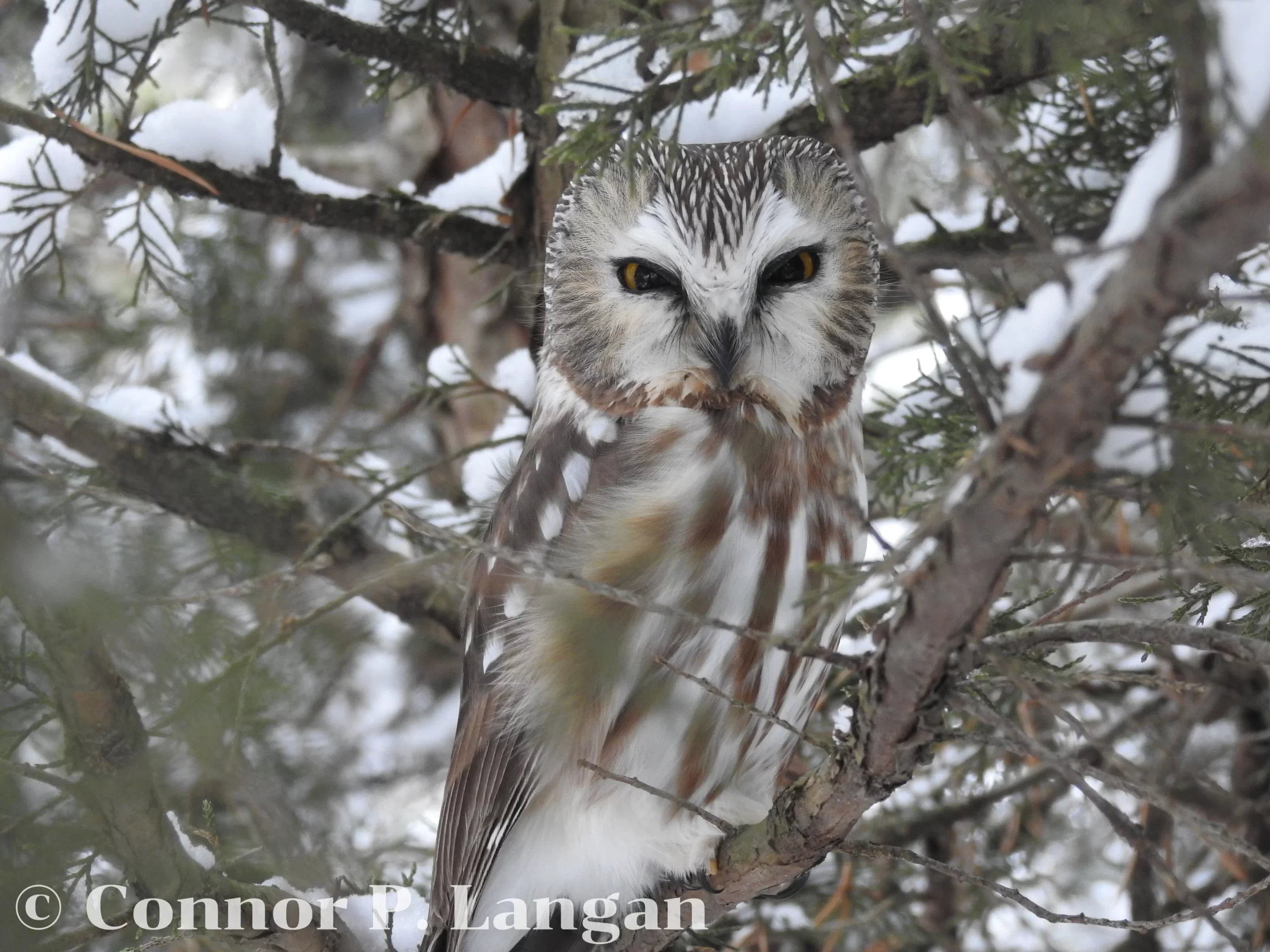Winter is the most difficult season for most animals, and this is no different for owls. Despite their fluffy feathers and predatory tendencies, this time of year can be a real burden for them. So, how do owls adapt to the winter – do owls hibernate in the winter?
Birders around the world may notice that owls seem to be scarce during the winter months, leading many to speculate that owls in winter hibernate.
We’ll discuss the question, “Do owls hibernate or migrate?” and much more related to owl hibernation in this article. Let’s begin with a refresher on hibernation.
Table of Contents
What is Hibernation?
Most people have heard mention of hibernation before, but what, exactly, is hibernation? Without getting too technical, hibernation is a process by which animals lower their metabolism and slow down their bodily functions for an extended period of time.
Hibernation typically takes place during the winter months – a time in which food may be scarce and temperatures may be cold. The process of hibernation is used to conserve energy and help creatures to sustain themselves despite the challenging conditions.
Do Owls Hibernate In The Winter?
Hibernation can help animals survive the unforgiving season by allowing them to essentially bypass the cold weather until spring arrives. Many suspect that owls in winter hibernate to avoid the unfavorable weather. Is this true – do owls hibernate in the winter?
No, owls do not hibernate. Hibernation is most commonly observed in mammals, as birds have evolved the ability to migrate if need be. In the case of owls, these birds have developed adaptations that help them to survive the winter.
Do Barn Owls Hibernate?
Barn Owls have an extensive worldwide distribution. Indeed, these owls often breed in places with cold winters such as Germany, Scotland, and Ohio. Therefore, do Barn Owls hibernate come winter?
No, Barn Owls do not hibernate, as they instead migrate to warmer climates in the winter. In rare cases, a Barn Owl may try to live year-round in one of the aforementioned places, but these owls have a difficult time surviving winters.
You see, Barn Owls are not equipped to thrive in winter conditions like birds such as Snowy Owls. Speaking of which, do Snowy Owls hibernate?
Do Snowy Owls Hibernate?
If ever there were a bird with a valid reason to hibernate, it would be the Snowy Owl. You see, these birds of prey breed on the Arctic tundra – a location that is absolutely brutal during winter. So, do Snowy Owls hibernate in winter to escape the extreme cold?
No, Snowy Owls do not hibernate! Instead, these birds may move south into Canada and Europe to spend their winters. However, if food persists on the Arctic tundra, these birds are capable of living there year-round.
Why Don’t Owls Hibernate?
So, do owls hibernate or migrate? Well, some owls are known to migrate to warmer locations during the coldest times of the year. However, not all owl species migrate, and owl hibernation does not occur in any species.
Owls do not need to hibernate, as these feathered creatures are perfectly capable of surviving the blustery conditions of this season thanks to millions of years of evolution. This evolution has equipped owls with the traits necessary to handle winter.
Okay, so we know the answer to the question, “Do owls hibernate in winter?” is no, so what do owls do in winter if they aren’t hibernating?

What Do Owls Do In Winter?
Some may wonder what owls do all winter if they don’t hibernate. What do owls do in winter if they don’t hibernate?
Well, owls lead very active lives, but people rarely get to witness the excitement because most owls are nocturnal. Owls may hunt, preen, defend territories, and much more at night.
Owls keep a low profile during winter days. They do little other than sleep, rest, and keep watch.
How Do Owls Survive In The Winter?
Many owls have to contend with brutal winters that push them to their limits, so how do owls survive in the winter? Moreover, do owls get cold?
Fortunately, owls in winter can easily stay warm thanks to several adaptations that these remarkable birds have developed:
- Feather growth: One thing that helps owls stay warm during the winter involves these birds growing additional feathers to insulate their bodies from the cold.
- Controlling blood flow: These birds are also capable of cutting off blood flow to extremities such as their feet and legs, allowing them to provide additional warmth to their core.
- Creating energy reserves: In the weeks leading up to winter, owls may consume a substantial amount of food. This allows them to add additional fat to their bodies, which can help with insulation and be used as an energy source during times in which food is scarce.
- Migration: Some owls such as Barn Owls, Long-eared Owls, and Short-eared Owls are known to migrate to warmer locales as winter approaches. In doing so, they can avoid terribly cold weather and give themselves a better chance of survival.
The adaptations that owls have evolved allow them to feel quite comfortable despite the harsh conditions of winter.
Do All Owl Species Live In Places That Receive Snow?
You’ve surely seen many impressive images of owls set against a snowy background, so this may have you wondering if all owls survive in areas that receive snow. After all, well-known owls like Snowy Owls, Great Gray Owls, and Great Horned Owls are found in areas with snow.
So, are owls restricted to places that receive snow? It turns out that not all owl species live in areas with a cold winter season. In fact, dozens are native to tropical locales and island nations.

Where Do Owls Go In The Winter?
If you never see owls in winter, you may wonder where these birds of prey are going. So, where do owls go in the winter?
While some owls may leave your area for the winter, others remain for the whole year. There may also be owl species from different regions that travel to your area in the winter, so no matter the time of year, owls are sure to be present.
You may notice that owls seem to be difficult to find in the winter, so do owls hibernate in the winter after all? Though owls may be difficult to find in winter, this does not mean that owls hibernate.
Like humans, owls want to stay warm during the winter, so they’re likely to be hunkered down in sheltered areas where they can avoid wind and maintain warmth.
Owls also want to avoid being detected by other birds that may harass them if they’re found. This is easier to do during other times of the year when leaves in the trees help to hide them from other birds, but owls in winter have to find quiet locations where they can sleep during the day.
Owls often select coniferous trees as their chosen refuge during the day in the winter. So, owls are likely still in your area during the winter, but it may be difficult to find them in the conifers in which they roost.
If you hope to find a coniferous tree in which can owl routinely roosts, look for accumulations of pellets or owl poop below the tree.
How Do Owls Hunt During Winter?
As one can imagine, hunting in the winter presents a wide array of challenges for owls to overcome. Fortunately for these birds of prey, they are up to the task.
Everyone knows that owls have exceptional vision-their large eyes allow some owls to spot prey from half a mile away. However, did you know that owls also have some exceptional hearing?
It’s true! Species such as the Great Gray Owl are capable of detecting a vole running beneath a sheet of snow without ever seeing the mammal in the first place.

Therefore, the tandem of eyesight and hearing is quite important for a successful owl hunt during the winter.
Though winter conditions can be challenging for owls because they must find food in snowy landscapes, these conditions can also present opportunities for these feathered hunters.
Winter can be even more difficult for owl food sources. Creatures such as voles, mice, and rabbits have an especially hard time surviving this season. These animals often stand out on a snowy landscape, making it easier for owls to capture their quarry.
Winter Owl Irruptions
One of the reasons that some may ask, “Do owls hibernate in winter?” is due to owl irruptions. If you’ve been birding for long enough, you surely have heard the term “irruption” being thrown around in conversation. So, what is an irruption and how does it relate to owls?
As it relates to birding, an irruption is an occurrence in which a certain bird species occurs in considerable numbers further south of its traditional winter habitat.
Irruptions are known in birds such as finches, Red-breasted Nuthatches, and—yes—owls. An example of an owl irruption would be Snowy Owls occurring in Midwestern states like Iowa, Illinois, and Indiana in decent numbers.
So, why do owl irruptions occur? Well, these phenomena are caused by cold temperatures and a lack of prey availability in typical parts of an owl’s winter range.
Additionally, irruptions may also occur when an owl species has a productive year of reproduction, resulting in an influx of owls.
All of these factors may cause owls to appear further south than they typically occur. While this can be exciting for birders, it is important to give these birds ample space. Many owls that have moved south in irruptive years may be hungry and struggling to find food.

Conclusion
Do owls hibernate in the winter? You can be certain that the answer to this question is no, owls do not hibernate during winter.
Owls are active during the winter months, though some species may migrate to different locations. Others will remain in the same area all year, but they may be difficult to find as they seek shelter in dense coniferous trees.
Owls have evolved several adaptations that help keep them warm in winter. Such adaptations mean that owls do not need to hibernate in the winter.

